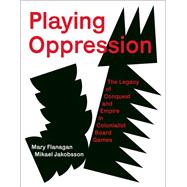A striking analysis of popular board games’ roots in imperialist reasoning—and why the future of play depends on reckoning with it.
Board games conjure up images of innocuously enriching entertainment: family game nights, childhood pastimes, cooperative board games centered around resource management and strategic play. Yet in Playing Oppression, Mary Flanagan and Mikael Jakobsson apply the incisive frameworks of postcolonial theory to a broad historical survey of board games to show how these seemingly benign entertainments reinforce the logic of imperialism.
Through this lens, the commercialized version of Snakes and Ladders takes shape as the British Empire’s distortion of Gyan Chaupar (an Indian game of spiritual knowledge), and early twentieth-century “trading games” that fêted French colonialism are exposed for how they conveniently sanitized its brutality while also relying on crudely racist imagery. These games’ most explicitly abhorrent features may no longer be visible, but their legacy still lingers in the contemporary Eurogame tendency to exalt (and incentivize) cycles of exploration, expansion, exploitation, and extermination.
An essential addition to any player’s bookshelf, Playing Oppression deftly analyzes this insidious violence and proposes a path forward with board games that challenge colonialist thinking and embrace a much broader cultural imagination.








